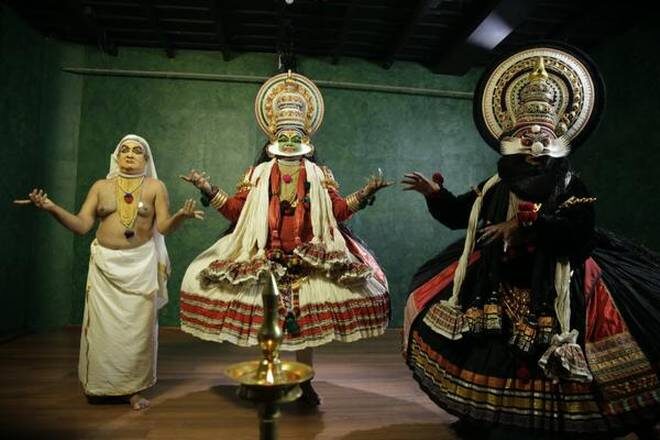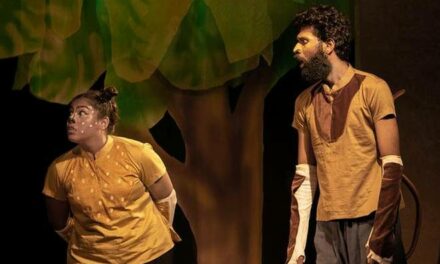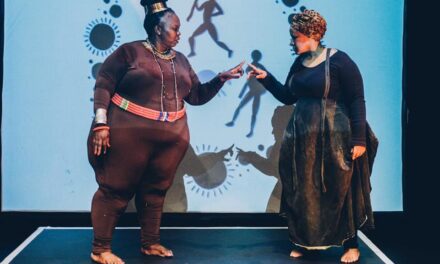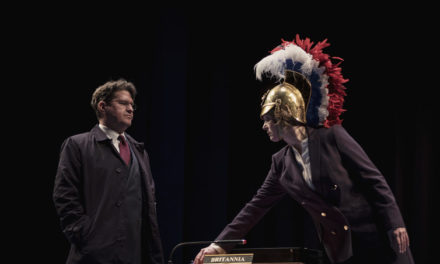Jagratha, a five-minute play in the Kathakali format, written and choreographed by Margi Vijayakumar, details the precautions and measures to be taken against COVID-19
Summary
The stage is set for a battle royale between COVID-19 and humanity. As demon Coronavirus stomps around the world, conquering and consuming lives, Man watches in despair and fear. Finally, a ‘rakshakan’ (protector) appears on the scene and advises mankind on how to defeat the fearsome demon in the shape of a virus. By following his advice and by wearing masks, using sanitizers, and staying at home behind locked doors, they manage to escape the marauding demon. Finally, when Man steps out, the virus has been erased and mankind is set free.
Materialization of the Idea
Narrated in the Kathakali format, Jagratha is an innovative piece in the traditional art form of Kerala. It was composed and enacted by artistes of Margi, a cultural organization and training center of traditional art forms in Thiruvananthapuram.
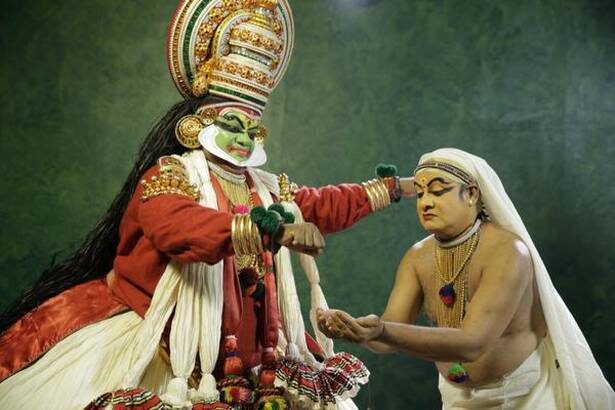
Margi Vijayan (right) and Margi Balasubrahmanyan in a scene from Jagratha, conceptualized and choreographed by Margi Vijayakumar, Principal of Margi in Thiruvananthapuram. Photo from the original article.
Although Kathakali has many memorable battle scenes in its repertoire, veteran Kathakali artiste Margi Vijayakumar was taken aback when he was requested to come up with a Kathakali play on COVID-19, a short one that depicted precautions and measures to stop its spread. But he did conceptualize, write and choreograph the five-minute play, which depicts the coronavirus as a demon on the rampage.
Vijayakumar, Principal of Margi, recalls the efforts that went into the creation of the play and the recording.
“I am not a writer or poet. So when S. Srinivasan, secretary of Margi, wanted me to conceptualize a social awareness message in the medium of Kathakali, I was a little hesitant,” says Vijayakumar.
Nevertheless, he wrote a few verses and sent it to be polished to linguist and Kathakali connoisseur Prabodhachandran Nayar. Once the scholar finished the work, Vijayakumar refined it once more and got down to work on its performance.
“This verse had to be enacted in the visual language of Kathakali and so I had to make sure that the words could be translated into the performance idiom of Kathakali. For instance, I had to use my imagination to find a word for ‘lockdown’ as there is no mudra (hand gesture) to depict that. Instead of using that particular word, I came up with lines that suggested people locking up themselves in their houses and staying behind closed doors and windows,” explains Vijayakumar.
Characters
Three characters narrate the theme of the play. Vijayakumar visualized the virus in the character of Kali, one of the characters in the story of Nalacharitham, a play in Kathakali excerpted from the Mahabharatha. Dressed in black, Kali is an evil spirit that poisons Nala’s mind and creates all kinds of problems in his life.

Margi Vijayakumar, Principal of Margi in Thiruvananthapuram. Photo from the original article.
“I imagined the virus as Kali while one of the characters represents mankind. The other character comes as the Rakshakan. In this present scenario, the protector could symbolize health workers, government machinery, administration, and so on,” says Vijayakumar.
Composed in ragas Punnagavarali and Vaghdeshswari, the songs have been rendered by Kalanilayam Vishnu while the melam has been led by Margi Krishnadas and Margi Ratnakaran.
Margi Suresh, Margi Vijayan, and Margi Balasubrahmanyan play the three characters.
“We had several rehearsals and dress rehearsals at Margi’s performance space before recording it. I was satisfied when many appreciated the piece, especially because it showcased how even a traditional art form that has a strict syntax can be imaginatively adapted to narrate a contemporary theme,” says Vijayakumar.
Result
Srinivasan, who set the ball rolling for such an initiative also says that he is happy that Margi was able to come up with such a theme within a short time. The recording was done at Invis Studio in Thiruvananthapuram.
This article appeared in TheHindu.com on June 23rd, 2020, and has been reposted with permission. For the original article, click here.
This post was written by the author in their personal capacity.The opinions expressed in this article are the author’s own and do not reflect the view of The Theatre Times, their staff or collaborators.
This post was written by Saraswathy Nagarajan.
The views expressed here belong to the author and do not necessarily reflect our views and opinions.

